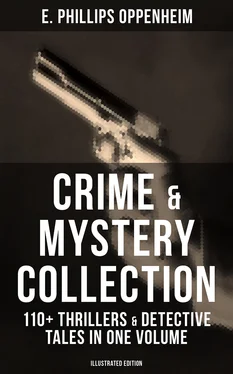“That sounds all right,” Faulkener observed. “Anything else?”
Goade proceeded with his lunch for a moment in silence.
“Unfortunately,” he admitted, “there does appear to be another trifling incident on the other side of the ledger. Without the slightest doubt on the seventh of July—that, I think, was the day after the dance at Exeter Park and the day upon which Lord Geoffrey returned to London—the emerald pendant lost by Miss Followay was pawned in Holborn for one thousand pounds by a young man giving the name of Geoffrey Fernell and answering in every respect to the appearance of Lord Geoffrey.”
“God bless my soul!” Faulkener gasped.
“It just shows us,” Goade continued, stooping down to pat Flip, “the hypocrisy that exists in our very midst. There are points about this matter which probably are puzzling you as they certainly are puzzling me, but I imagine that by proceeding calmly everything will be made clear to us in the end.”
Faulkener looked up at his companion suspiciously.
“I say, Goade, you’re not kidding or anything, are you?”
“I was never more serious in my life,” was the prompt assurance. “I’ve done what you asked up to the present. I have made all my enquiries unofficially, and I have discovered what you wanted to have discovered. The Dean has now the whole position before him. As a Christian and an upright man, I presume that there is only one course open to him.”
“You mean that he’ll have to prosecute?”
“What else can he do?” Goade argued. “The young man appears to have behaved damnably. He was attracted by Miss Followay in London. When meeting her at the house of the Princess Shibolzky, he imagined her to be a young woman of wealth. Down in the country he discovers her to be the daughter of an impoverished Dean, existing under the patronage of his family. He helps himself to her one possession, convinced—and rightly convinced, as it seems—that the Dean would never dare to put the matter into the hands of the police for fear of offending the great family of the district. I didn’t like that young man, Faulkener, the moment I saw him.”
“But your dossier? What could he want a thousand pounds for? Apparently he doesn’t race, drink, gamble, or keep women.”
Goade nodded thoughtfully.
“Men have strange ways of getting rid of money sometimes,” he observed, “and even a Scotland Yard dossier has its limitations. In the meantime what about it all? Are you coming round with me to the Deanery?”
“I suppose I had better,” Faulkener observed, a little dubiously. “You must remember, however, Goade, that your visit must still be entirely unofficial.”
“We’ll all go unofficially,” Goade agreed—“even Flip.”
AT a somewhat early hour that afternoon a formidable assemblage of visitors was ushered by the butler into the stately library of Exeter Park. Florence entered first, pale but determined. She was followed by the Dean, angry yet nervous. Faulkener, considerably embarrassed, came next, and Goade, with Flip—who had evaded the servitors at the door—under his arm, brought up the rear. The butler waved them to chairs. If he felt any surprise at this unusual visitation his face showed no signs of it.
“His Grace shall be informed of your presence, sir,” he announced, with a little bow to the Dean—after which he took his leisurely departure.
The four maintained a grim silence during their period of waiting. Presently the door was thrown open, and an elderly lady, so true to type that she reminded one of Du Maurier’s Duchesses of Punch repute, entered the room, followed by a long, lean man with frosty blue eyes, a thin mouth, and a glacial bearing. The visitors rose to their feet. The Duke and Duchess shook hands with the Dean and his daughter in perfunctory fashion, accorded some sort of salutation to Captain Faulkener, and, after a glance of cold surprise, ignored Goade. The Duchess seated herself in a comfortable chair; the Duke stood by her side.
“To what,” the latter asked, scrutinising the little group through his eyeglass, “are we indebted for this, may I say, unexpected visitation?”
The Dean took the floor, and at the sound of his own voice he felt better. It was a voice which had awed the sixth form of a great public school, which had rung through the halls of many a Church Congress, which had earned for him his stole, and would probably earn for him a bishopric.
“Your Grace,” he said, “I can assure you that it is with the greatest reluctance I have come here this afternoon. Nothing but a strong sense of duty could have induced me to have intruded upon you and her Grace or to have brought to your notice a matter as disagreeable to ourselves as I am sure it will be painful to you.”
The Duchess raised her lorgnettes for a moment and closed them with a snap.
“Has your daughter come to make a fuss about her bit of glass?” she asked coldly. “My servants have already had orders to restore it as soon as it has been found.”
“That bit of glass, as your Grace calls it,” the Dean continued, “is a very valuable emerald pendant bequeathed to my daughter by her godmother, the Princess Shibolzky. There is, I fear, no chance of your servants being able to restore it, for its presence has been discovered in a pawnshop in London. I may add that, notwithstanding your Grace’s disparaging reference to it, the jewel was pawned for a thousand pounds.”
“And by whom?” the Duke asked.
“I regret to say, your Grace, by your son,” the Dean announced, pausing for a moment to give his words full effect.
It was, at any rate, an achievement to have surprised two people who seemed incapable of feeling of any sort. The Duchess’s expression was one of disdainful horror. The Duke’s jaw had fallen a little, and incredulity was written in every line of his face.
“By my son! By Lord Geoffrey!” the latter gasped at last. “I never heard anything more ridiculous in my life. Dean, are you aware of what you have said? Am I to look upon you as being concerned in this—I can only call it conspiracy?”
“Your Grace,” the Dean replied, “the facts are as I have stated them. My daughter was appalled at her loss. She feared to speak plainly in your house, but on her return to the Deanery she admitted frankly that the pendant was lost during the few moments when Lord Geoffrey withdrew a scarf which, without any ostensible reason, he had insisted upon her wearing. I sympathise with my daughter’s sensations. She was confident that the jewel was in your son’s possession, but she felt herself utterly unable to deal with the situation beyond announcing her loss.”
“Let me understand this matter,” the Duchess said. “There will be more to be heard of it later. Steps will be taken. I understand you to say, Dean, that your daughter, on returning from her unfortunate visit here, confided to you that her pendant was lost, and expressed the opinion that it had been stolen by Lord Geoffrey?”
“That is true,” the Dean admitted. “I cross-questioned my daughter in every way, but there was no shaking her conviction.”
“Let her speak for herself,” the Duchess continued, with all solemnity. “Young woman, have you come here to accuse my son of having stolen your pendant? My son! Lord Geoffrey! The heir to the Dukedom!”
“I didn’t want to come,” the girl replied, with a little tremor in her voice. “If Lord Geoffrey had asked me for the pendant I should have given it to him. The fact is, though, that he took it. I felt practically certain that his fingers undid the clasp when he was taking that wrap away. Almost directly after he left me I saw that it was gone. Now it has been discovered in a pawnshop in Holborn, pawned under the name of Geoffrey Fernell.”
Читать дальше












